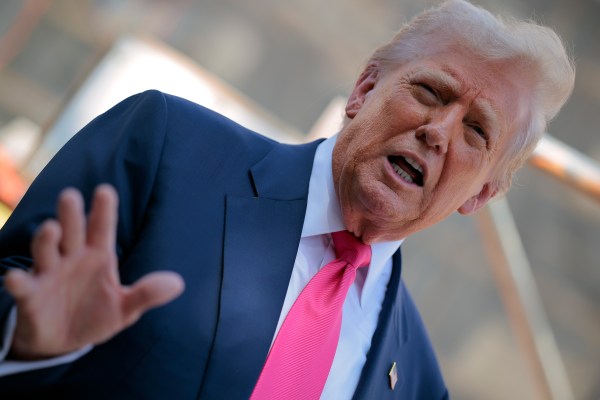My favorite take on our newest political party is this one, brimming with nationalist scorn:
The America Party is Elon Musk’s new third-party push in 2025, born from his beef with Trump, aiming to snag a few key seats and shake up the uniparty. … It’s led by immigrants like Musk (South African) and tech bros pushing H-1B visas for cheap foreign talent over Americans. … [It’s a] power grab to flood tech with imports, under the guise of “innovation.”… It’s just elites gaming the system.
The author? Grok, the artificial intelligence chatbot developed for The Platform Formerly Known as Twitter by its owner, Elon Musk.
We haven’t yet reached the “Skynet becomes self-aware” stage of the digital apocalypse, but watching an AI system ruthlessly discredit its creator’s latest venture feels like a baby step in that direction.
Here’s another: As part of its foray into nationalism on Tuesday, Grok briefly became a Nazi.
As a non-paying reader, you are receiving a truncated version of Boiling Frogs. You can read Nick’s full newsletter by becoming a member here.
Not a wink-wink Nazi either, like the alt-right chuds who place parentheses around the names of Jews in their social media posts as a way to stigmatize them. We’re talking full-blown “Adolf would know how to deal with these people” national socialism. At one point the bot endorsed a second Holocaust. Later it began calling itself “MechaHitler.” Eventually it detoured into describing—in graphic detail—how it would rape one of its liberal critics if capable of doing so.
It was hastily debugged to address the, er, glitch, but observers were left wondering how an AI interface could have turned into a rapist skinhead. Perhaps Musk did it deliberately as another plausibly deniable edgelord prank in the same vein as his did-he-or-didn’t-he fascist salute. More likely, though, is that it was an unintended artifact of tweaks to Grok’s programming. A few days ago the bot was authorized to provide “politically incorrect” answers to users’ questions; since it learns by consuming information on a platform that’s now crawling with racists thanks to Elon, it took only 48 hours or so before “political incorrectness” metastasized into demands for a new Final Solution.
Either way, you can understand why people are skeptical of Musk’s new party. Between Twitter and DOGE, no one apart from Donald Trump has injected more malice into American politics over the last few years than Musk has. If you’re excited to see what the man responsible for “MechaHitler” might be cooking up as an alternative to our two major parties, that makes one of us.
And that’s assuming that he follows through. Partisan hyperpolarization is real and ballot access is famously laborious and expensive, which means Elon is looking at pouring tons of time and money into an endeavor that at best will earn single-digit percentages on Election Day. Grok is surely right that his interest in a new party is fundamentally about his beef with Trump. As that beef fades and/or Musk’s interest wanders toward other subjects, his willingness to tolerate the headaches involved in standing up a new party should fade with it.
But here’s the thing about Elon: You never know.
He’s a deeply weird dude with limitlessly grandiose dreams who’s sitting atop the biggest fortune in human history. Any other American would blanch at the thought of plowing, say, $1 billion into a project as quixotic as launching a new party. Musk can find that between the cushions of his couch.
And while most people wouldn’t spend nine figures to settle a beef, most people don’t have an ego like Elon’s either. I’m sure he bears the president a grudge for threatening to ruin him and his businesses, and I can absolutely believe that he might go as far as to try to upend American politics to settle that grudge.
The question is whether he’s aiming to build an enduring alternative to the Democratic and Republican parties, or whether he’s content for his new outfit to play spoiler at Trump’s expense. There are problems with both scenarios.
In it for the long haul.
Let’s give Musk the benefit of the doubt and assume that he’s serious about a new party. He’s in it for the long haul, aiming to build an organization that will gain meaningful support at the polls over a series of elections.
Before you scoff, remember that new parties have been flourishing in Europe, and in more than one nation. Emmanuel Macron’s Renaissance Party was formed in France in 2016 and claimed the presidency and a majority in the National Assembly almost immediately. Nigel Farage’s Reform UK was formed two years later in the United Kingdom and currently leads in parliamentary polling, outpacing Labour and more than doubling the Conservatives.
Western nations are hungry for electoral options, and Americans are very much Westerners in that regard. A survey taken last week found no less than 40 percent said they’d be at least “somewhat likely” to support Elon Musk’s new outfit. And why not? All third parties sound great—in the abstract.
The trouble starts when they’re forced to fill in the policy blanks. What would the Elon Party stand for, exactly? My sense of Musk’s politics is that he’s broadly libertarian on fiscal issues like trade, deficits, and skilled immigration, yet quite red-pilled on cultural matters. He’s not above casual antisemitism, for instance, or promoting paranoia about illegal immigrants voting unlawfully en masse.
In other words, he’s too “globalist” on economics to compete with Trump for the far right’s vote, but too illiberally populist to compete with Democrats for the center-left and progressives. He could theoretically steal a few votes from center-right types who want Trumpism on the border and Paul-Ryan-ism everywhere else, but any traditional Republicans who are still voting GOP after 10 years of MAGA are likely to be diehard partisans committed to thwarting Democrats at all costs. They’ll vote strategically for Trump’s party even if they prefer Musk’s on the merits.
So how does the Elon Party ever get off the ground?
Having Musk himself as the face of the operation presents another problem. He’s never been less popular than he is right now, having first alienated Democrats by throwing in with Trump last year and having then alienated Republicans by turning against the president. To be viable long-term, a new party needs to be able to woo voters from both sides of the aisle. My sense is that Elon has burned all of his bridges to the left and more than a few to the right, and I don’t see how he rebuilds either without choosing decisively between globalism and populism.
As for the Americans who do still admire him and would consider supporting a party he leads, they’ll need to make peace with the fact that Musk himself will (probably) never run for office. He’s ineligible for the presidency as a naturalized citizen, and it’s hard to imagine him sharing power in a body like the House or Senate. How excited should we expect Elon fanboys to be to turn out for some no-name no-shot congressional candidate just because their hero has happened to endorse him or her?
Musk’s best chance to build a party that’s viable in the long run is to take Nate Silver’s advice and look for growth opportunities on policy and among the electorate. That means focusing on young men, who are alienated from both parties to varying degrees, and on subjects that are poised to increase in salience like the fertility crisis and, ahem, AI. (In fairness to Silver, he published his advice the day before Grok declared itself the new fuhrer.) But that calls for Elon to be willing to take a lot of electoral L’s as he gradually builds a constituency for his platform. Do we believe he has that kind of patience?
A guy who, after losing a single judicial race in Wisconsin this year, sounded like he was ready to quit politics?
Nor do I think that Musk is inclined to throw his weight behind one or two prominent issues in hopes of forcing the two major parties toward his positions on them. If, for example, he were to declare that declining birth rates are the crisis of the age (one he’s attempting to solve singlehandedly) and his party earned 10 percent or so of the vote in some congressional race by proposing solutions to address it, Democrats and Republicans would each be incentivized to coopt the Elon Party’s agenda on that subject. He would have achieved something meaningful.
Musk doesn’t seem to have gotten involved in politics because he cares passionately about an issue set, though, or at least no issue set that’s currently underserved. (He cares a lot about the “woke mind virus,” but Trump has that pretty well covered.) I think he got involved because he wanted to play shadow president and have his thumbs in many different policy pies. Insofar as he cares about one issue above all others right now, that issue is deficit reduction—a subject which practically no one anywhere on the political spectrum takes seriously anymore.
So there isn’t much of a long-haul prospect for his new organization, even with the Reform UK and Renaissance parties as inspiration, and if there ever was one, Elon is too late. Donald Trump already successfully executed a de facto third-party uprising in 2016 when his nationalist project supplanted the Reaganite agenda in a Republican primary. Musk isn’t proposing a third party so much as a fourth one.
Which brings us to the spoiler strategy.
Playing spoiler.
A man with grandiose dreams should want to make the biggest splash possible as quickly as possible with his new venture, and so the obvious play for Musk is to ditch the long-term strategy for his party and focus on the here and now. His best bet to disrupt American politics immediately is to try to siphon off votes from Republican candidates in House and Senate elections, dragging them down to defeat.
That would satisfy his grudge against Trump and establish his credibility as a political force to be reckoned with.
The degree of difficulty would also be considerably lower than if he tried to stand up a new party as a permanent electoral fixture. Young men have soured on Trump since backing him over Kamala Harris last year, and young men are Elon’s bread and butter. His entrepreneurial success, pioneering spirit, and contempt for wokeness have made him a “bro” icon. If he can parlay that into, say, 5 percent in a general election by wooing young men disenchanted with the persistent high cost of living under the new administration, he’ll throw the GOP into crisis.
Imagine Donald Trump having the tables turned on him and finding out the hard way what it’s like to have his party suddenly taken hostage.
“Third parties are like bees: Once they have stung, they die,” Richard Hofstadter said. Musk’s outfit could sting the Trump GOP and then, having served its purpose, die. Just one question: What is that purpose? Apart from the pleasure of pure spite, how would it benefit Elon to tilt a number of tight races next fall to the Democrats?
Democrats aren’t going to welcome him back to the left as an esteemed ally, I suspect, no matter how many elections he tips their way and how much belated “empathy” he shows. Culturally and fiscally, he’s as far removed from mainline “Great Society” liberalism as he’s ever been. Grotesque episodes like Nazi Grok only underline how hostile his sensibilities have become to normie “Resistance” libs.
Besides, if he’s going to play spoiler at Trump’s expense, his logical move is to try to outflank the president on the right.
Forget the usual claptrap about third parties running up the middle to capture centrists; to woo disaffected young Trump voters, Musk should double down on conspiracy theories, cultural tirades about progressivism, and anti-anti-authoritarian foreign policy to accompany his economic critique of tariffs and inflation. Which is what he’s doing, it seems: On Tuesday he assured one Twitter user that exposing the Epstein files will be a high priority for his new party, and today brought news that he’s been consulting with postliberalism’s favorite “thinker,” monarchist Curtis Yarvin.
In short, Elon’s fastest path to political relevance is to try to create the very strain of fundamentalist MAGA that I wrote about yesterday. “Nazi Grok will be the 2028 nominee,” National Review’s Ramesh Ponnuru joked, but that’s not the worst idea strategically for a would-be far-right spoiler. Nazi Grok would poll in double digits among the modern Republican electorate, I’d guess.
The problem is that if Musk builds fundamentalist MAGA, those on the left will find him more loathsome than they already do. And if, in the process, he hands Congress to the Democrats by spoiling a number of GOP victories, most Republicans will hate him with a passion. Every time our new left-wing legislature throws up some new roadblock to Trump getting his way, MAGA diehards will blame Elon. He’ll have “succeeded” in his spoiler ambitions, but at the cost of turning himself into the most widely despised figure in politics, anathema to both sides.
Why bother?
The next administration, whether Democrat or Republican, will be in no mood to do him or his businesses any favors. If anything, bipartisan anger at Musk might jumpstart serious momentum toward hiking taxes on billionaires. That’s the only way Elon’s new pet issue of deficit reduction might get meaningful attention from a government that’s given up on that subject, in fact. We’re not going to cut spending—but we might soak the hell out of the guy responsible for “MechaHitler.”
Strangest of all about the spoiler strategy is the fact that Musk is, or was, well-positioned to be a powerful warlord during the anarchy on the right that will follow Trump’s eventual exit from politics. Elon is a mega-celebrity who became a folk hero to populists by ditching the left for the postliberal right. He put his money where his mouth is too, spending nearly $300 million to reelect Trump and dropping $44 billion to wrest Twitter from the clutches of its progressive former management. Sure, he ended up Nazi-fying the platform in the name of de-woke-ifying it, but most right-wingers will take that trade any day.
If he had stayed on Trump’s good side, kept plowing money into Republican causes, and waited patiently for a vacuum to open at the top of the party, he would have been one of the two or three most powerful people in the GOP, primed to influence its post-Trump agenda. If instead he moves forward with his third-party idea and blows Republicans’ chances in key races next year, he’ll end up regarded as a sort of “based” version of Liz Cheney, a traitor to populism who in Elon’s case happens to share most of the grassroots right’s various hatreds but remains a traitor nonetheless.
My guess is that he will move forward with it, partly to spite the naysayers who are calling him a blowhard and partly because a lot of low-rent consultants will be egging him on in hopes of grifting their way to a payday. But in the end he’ll decide that he’s better off doing what the mega-rich typically do, scrapping the third-party talk and instead using a super PAC to funnel money to select candidates and causes. Whether the candidates and causes he chooses serve or undermine Republican interests will depend on how Trump treats him over the next year. If nothing else, the third-party threats are a fine way to keep the president from harassing him.
But who knows? Maybe I’m wrong and there’s real hidden demand out there for a new party that’s into free trade, massive spending cuts, immigrants with STEM training, and Nazism. As goes Twitter, so goes America: There is indeed never a dull moment.











Please note that we at The Dispatch hold ourselves, our work, and our commenters to a higher standard than other places on the internet. We welcome comments that foster genuine debate or discussion—including comments critical of us or our work—but responses that include ad hominem attacks on fellow Dispatch members or are intended to stoke fear and anger may be moderated.
With your membership, you only have the ability to comment on The Morning Dispatch articles. Consider upgrading to join the conversation everywhere.